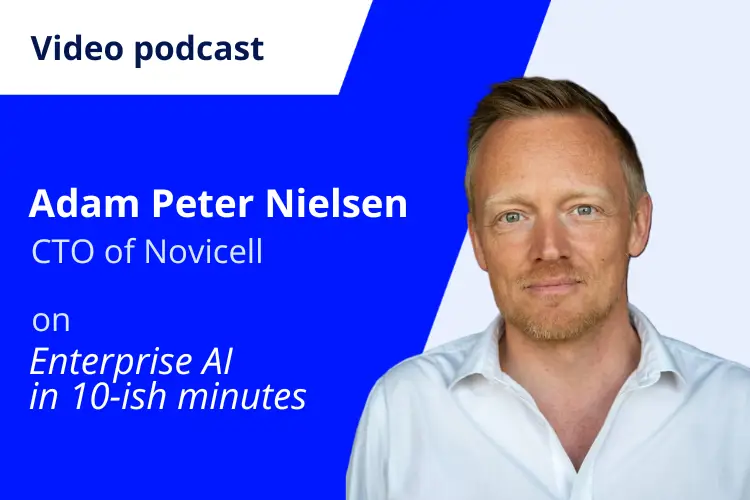Should e-commerce fear agents? Short answer: only if you don’t govern them.




We were lucky enough to lure Novicell’s Group CTO, Adam Peter Nielsen, into our podcast to talk with our CEO Toke Lund about the role of AI agents i e-commerce.
Below, we've plugged a few of Adam's excellent points, but if you want to skip right ahead and watch the full 10+-minute podcast, you can find it at the end 📽️🍿
Enjoy!
We’ve all seen the flood: languages, images, now video. The real value, Adam argues, lands when mature language and context models meet governed enterprise data – not as a novelty demo, but as a repeatable capability.
|
“Apply mature language and context models to real-world data and see what it does to business data.” – Adam Peter Nielsen |
Let’s just throw in a quick translation for the board: This is about data supply chains into AI – provenance, security boundaries, and context that holds up in audit.
Adam’s forward view is that machine-to-machine commerce and agent-guided execution will compress cycles you currently spread across meetings, inboxes, and spreadsheets.
|
“We’ll see more machine-to-machine commerce, and even the negotiation phase of B2B procurement done within AI – maybe with a human in the middle. For many, that human won’t be there for long.” – Adam Peter Nielsen |
This is really about the workflow. Agents triage RFQs, compare contracts, propose terms within thresholds, and escalate exceptions. Parts of negotiation will move to machine-to-machine, but your team handles the outliers.
The question isn’t if you’ll use agents. It’s where you’ll let them operate first (and how you’ll govern them).
According to Adam, most companies have evolved from “IT → data → digital”. The next step is agentic, which basically means designing processes where software acts, not just stores.
|
“Most organisations were IT-first, then a little more data, then they got digital – now they need to get agentic.” – Adam Peter Nielsen |
The approach requires new guardrails (permissions, audit trails, rollback) and old-school clarity (ownership, SLAs, change control). But tools (such as Speedtrain 😉) can help too depending on your business operating model.
For instance, your agents can flag anomalies: margin-eroding discounts, duplicate listings, suspicious velocity, policy drift across markets.
Adam expects that agent-guided operations will become the normal within the next 6-18 months, and that machine-to-machine commerce will show up in more B2B stacks. Naturally, regulated sectors will move slower, but some will move first – and they will benefit.
|
“The fast movers in those industries will really reap the rewards.” – Adam Peter Nielsen |
And by speed he means how quickly you can connect systems, expose trustworthy context, and let agents ship work – without creating tomorrow’s risk report.
However, the edge won’t be “who has a model,” but rather who has governable context and clean flows.
If your teams still paste the same paragraph into six systems, you don’t have an AI problem – you have a data orchestration problem. Fix that, and agents stop being scary and start being compounding leverage.
And honestly, “copy-pasting” text around systems is not a rare sight in our experience. It is, however, extremely time-consuming.
That’s also Adam’s point:
|
“We’ll get more help to focus on what actually brings value instead of copy-pasting text around.” – Adam Peter Nielsen |
Lucky for you, Adam said a whole lot more💪 And we have it all on video. And you can watch it. It’s right here 👇

Thrown into tech marketing and loving it. Mother of two, wife of one, runner, and reader of romance.
© 2020 - 2026 Enterspeed A/S. All rights reserved.
Made with ❤️ and ☕ in Denmark.